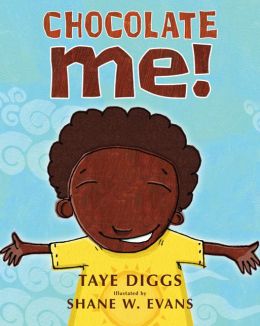Sitting in the waiting room at my doctor’s office, I
picked up an issue of WebMD magazine.
I quickly went through the pages, mostly paid advertising for drug companies,
with the occasional article on “Living Healthy,” “Fitness & Exercise,” and healthy
food and recipes.
Something caught my eye. It was a cartoonish character
with a dark brown face, apparently the cover of a new book titled Chocolate Me! Huh? Of course, the book was
written by a celebrity, actor Taye Diggs.

Apparently, Diggs wrote it to build self-esteem in
African American children. Good for him! But, it begs the question, “What about
multiracial children?” If Diggs is talking about foods, what does that mean for
multiracial kids? Carmel? Butterscotch? Light chocolate? What does it mean for
White kids? White Milk? Vanilla anything? Asian bananas?
It immediately reminded me of the Kraft Foods character
of MEL, who was a poor, confused multiracial MilkBite Granola Bar, but this one
is Black. We complained about that ridiculous promotion on this blog.
Taye Diggs is promoting Chocolate Me? to a wider audience than blacks. His promotional hype
states the following: “The title suggests it’s directed more toward
African-Americans, but we‘re all in this together.”
Here is the Publishers Weekly review:
It's tough being the
only African-American kid on the block. The young narrator's white
acquaintances tease him ruthlessly about his name, his dark skin ("It's
brown like dirt. Does it hurt to wash off?"), his wide nose, and his 'fro.
It's enough to make any kid wish he were just like everyone else—until Moms
offers just the right kind of comfort: "You have skin like velvet fudge
frosting mixed in a bowl.... Cotton candy hair soft to the touch of my
fingertips." The titular phrase is used like a refrain, initially a burden
and later a celebration of self. Actor Diggs, making his children's book debut,
gives an unvarnished take on the emotional impact of taunting that cuts to the
core of one's identity, though not every reader will find satisfaction in the
ending, in which the narrator is reconciled with his insensitive peers over
chocolate cupcakes. But Evans makes the hero's journey to confidence
irresistible, with bighearted, stylized pictures that draw on the emotionally
exuberant vocabulary of street art and anime. Evans doesn't minimize the
cruelty the boy suffers, but he makes it feel surmountable.
This book does belong in the kids section of our local
book stores or libraries. No, it is not for every child of any race, ethnicity,
or age. I recommend that you look at this book carefully and decide if the message is right for your children. It does talk about differences, values, and acceptance, so accept it
for what it is—a book for African American children, and not all kids.
Source: Susan Graham/Publishers Weekly/WebMD

No comments:
Post a Comment